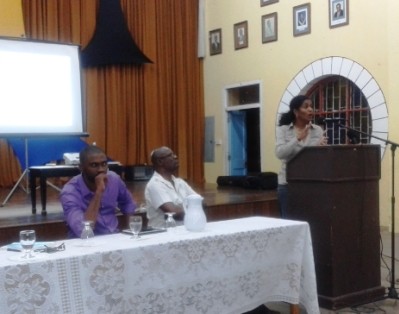
Minister of Labour, Senator Dr. Esther Byer Suckoo encouraged workers to know – and embrace – their role in productivity, during a panel discussion hosted by the Productivity Council at the Princess Margaret Secondary School, Six Roads, yesterday.
Addressing the event’s theme Consulting Workers Towards Improving Employee Productivity in Barbados, the Labour Minister stressed that “Each of us does not have to take on the challenge of rebuilding the whole economy, but the task that is assigned to you, accept that responsibility and do it to the best of your ability.”
Explaining that the meeting had been called to hear the worker’s view on productivity and factors affecting it, Dr. Byer Suckoo asserted that part of government’s role was to address macroeconomic policy and creating an attractive environment for investment; while the private sector would be concerned with investment and job creation. The worker’s role, she said, would be to execute tasks which helped both sectors achieve these goals.
Panel discussion participants included Chairman of the St. Philip South Constituency Council, Richard Bynoe and Human Resource professional, Edward Bushell, who noted that ‘presenteeism’ was relevant to the dialogue on productivity.
“About a year or two ago, I spoke about ‘presenteeism’ in Barbados…that people were at work but not ‘present’…you only find out at the end of the day that there was no productivity,” he said, adding that employers needed to have high expectation from their workers.
Another panelist, retired Deputy Secretary of the Barbados Workers Union, Alrick Sealy posited that for productivity to flourish, “work not ought to be seen as drudgery… we have to start seeing work in a positive light, it’s not a necessary evil, work is about putting in effort and reaping rewards…a man persuaded against his will is of the same mind still. Workers have to be responsible for their productivity.”
Fellow participant, Economic and Financial Consultant, Jeremy Stephen, agreed and said that sense of self was crucial for efficiencies to be increased and suggested that creating an incentive-driven society could aid the process.
“[Should we use] shareholding so that workers feel the results from efforts? …if they are wasteful, then they feel it in their dividends…maybe that’s where we need to start,” Mr. Stephens said, as he issued challenged the audience to grasp the value of their contribution as employees, “Don’t refer to yourself as a worker anymore…you are an economic agent.”





